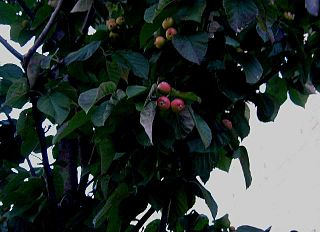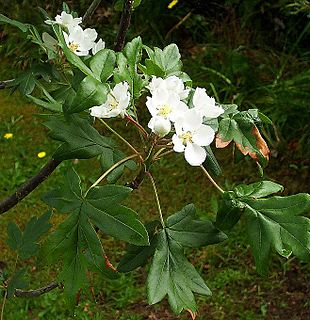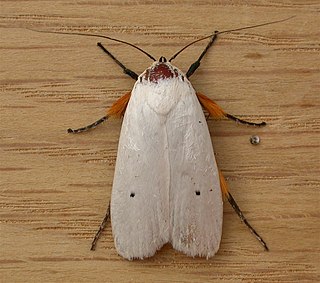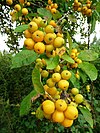
Malus is a genus of about 30–55 species of small deciduous trees or shrubs in the family Rosaceae, including the domesticated orchard apple – also known as the eating apple, cooking apple, or culinary apple. The other species are commonly known as crabapples, crab apples, crabtrees, or wild apples.

Malus tschonoskii is a species of flowering plant in the family Rosaceae, native to Japan.

Malus coronaria, also known by the names sweet crabapple or garland crab, is a North American species of Malus (crabapple). It grows primarily in the Great Lakes Region and in the Ohio Valley, with outlying populations as far away as Alabama, eastern Kansas, Long Island, and Ontario.

Docynia is a genus of flowering trees, evergreen or semi-evergreen, in the family Rosaceae. The fruit is a pome.
Malus brevipes, with the common name shrub apple, is a species of crabapple in the genus Malus, in the family Rosaceae.

Malus doumeri is a species in the genus Malus in the family Rosaceae, that resembles Docynia and has been placed in that genus in the past. It is native to temperate and tropical Asia. The fruit is edible.
Malus glabrata, commonly known as Biltmore's crabapple, is a species in the genus Malus, in the family Rosaceae. It is grows in South-eastern North America.
Malus honanensis is a wild species in the genus Malus, in the family Rosaceae, with no established common name, and used as rootstock for the domesticated apple.
Malus kansuensis is a species in the genus Malus in the family Rosaceae, called with the common name Calva crabapple. A tree of this variety would produce a yellow fruit in the size a half an inch. The white flowers are about 2 inches across.
Malus rockii is a crabapple species in the family Rosaceae. It is native to China and Bhutan.

Malus sieboldii, commonly called Siebold's crab, Siebold's crabapple or Toringo crabapple, is a species of crabapple in the family Rosaceae.

Malus toringoides is a crabapple species in the family Rosaceae, with the common name cut-leaf crabapple.

Malus transitoria, the cut-leaf crabapple, is a species of flowering plant in the crabapple genus Malus of the family Rosaceae, native to China.

Malus trilobata, the Lebanese wild apple, erect crab apple or three-lobed apple tree, is a species in the family Rosaceae in the genus Malus. Some authorities place it in the segregate genus Eriolobus, as Eriolobus trilobatus.

Malus yunnanensis is a species in the genus Malus, family Rosaceae, with the common name Yunnan crabapple. In Mandarin Chinese, it is called “滇池海棠”.

The fruit tree borer is a moth of the family Xyloryctidae. It is native to Australia.

Malus asiatica also known as the Chinese pearleaf crabapple is a species in the genus Malus, in the family Rosaceae. It is native to China and Korea.

Malus × micromalus, the midget crabapple or Kaido crabapple, is a species in the genus Malus, in the family Rosaceae.

The Maleae are the apple tribe in the rose family, Rosaceae. The group includes a number of plants bearing commercially important fruits, such as apples and pears, while others are cultivated as ornamentals. Older taxonomies separated some of this group as tribe Crataegeae, as the Cydonia group, or some genera were placed in family Quillajaceae.

Malinae is the name for the apple subtribe in the rose family, Rosaceae. This name is required by the International Code of Nomenclature for algae, fungi, and plants, which came into force in 2011 for any group at the subtribe rank that includes the genus Malus but not either of the genera Rosa or Amygdalus. The group includes a number of plants bearing commercially important fruits, such as apples and pears, while others are cultivated as ornamentals.















